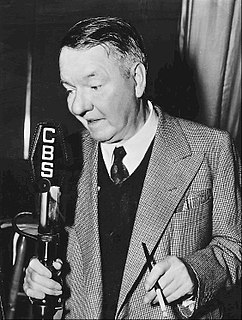A Quote by Samuel Smiles
It is the close observation of little things which is the secret of success in business, in art, in science, and in every pursuit in life. Human knowledge is but an accumulation of small facts made by successive generations of men--the little bits of knowledge and experience carefully treasured up by them growing at length into a mighty pyramid.
Quote Topics
Accumulation
Art
Bits
Business
Carefully
Close
Every
Experience
Facts
Generations
Growing
Human
Human Knowledge
Knowledge
Knowledge And Experience
Length
Life
Little
Little Bit
Little Thing
Little Things
Made
Men
Mighty
Observation
Pursuit
Pyramid
Science
Secret
Small
Success
The Secret Of
Them
Things
Treasured
Up
Which
Related Quotes
Knowledge signifies things known. Where there are no things known, there is no knowledge. Where there are no things to be known, there can be no knowledge. We have observed that every science, that is, every branch of knowledge, is compounded of certain facts, of which our sensations furnish the evidence. Where no such evidence is supplied, we are without data; we are without first premises; and when, without these, we attempt to build up a science, we do as those who raise edifices without foundations. And what do such builders construct? Castles in the air.
Intellect begins with the observation of nature, proceeds to memorize and classify the facts thus observed, and by logical deduction builds up that edifice of knowledge properly called science? But admittedly we also know by feeling, and we can combine the two faculties, and present knowledge in the guise of art.
Gradually, ... the aspect of science as knowledge is being thrust into the background by the aspect of science as the power of manipulating nature. It is because science gives us the power of manipulating nature that it has more social importance than art. Science as the pursuit of truth is the equal, but not the superior, of art. Science as a technique, though it may have little intrinsic value, has a practical importance to which art cannot aspire.
Can any rational person believe that the Bible is anything but a human document? We now know pretty well where the various books came from, and about when they were written. We know that they were written by human beings who had no knowledge of science, little knowledge of life, and were influenced by the barbarous morality of primitive times, and were grossly ignorant of most things that men know today.
I really see no harm which can come of giving our children a little knowledge of physiology. ... The instruction must be real, based upon observation, eked out by good explanatory diagrams and models, and conveyed by a teacher whose own knowledge has been acquired by a study of the facts; and not the mere catechismal parrot-work which too often usurps the place of elementary teaching.
All our knowledge hast its origins in our perceptions … In nature there is no effect without a cause … Experience never errs; it is only your judgments that err by promising themselves effects such as are not caused by your experiments … Science is the observation of things possible, whether present or past; prescience is the knowledge of things which may come to pass.
With ordinary men the moments which are united in a close continuity out of the original discrete multiplicity are very few, and the course of their lives resembles a little brook, whereas with the genius it is more like a mighty river into which all the little rivulets flow from afar; that is to say, the universal comprehension of genius vibrates to no experience in which all the individual moments have not been gathered up and stored.
Each member of society can have only a small fraction of the knowledge possessed by all, and...each is therefore ignorant of most of the facts on which the working of society rests...civilization rests on the fact that we all benefit from knowledge which we do not possess. And one of the ways in which civilization helps us to overcome that limitation on the extent of individual knowledge is by conquering intelligence, not by the acquisition of more knowledge, but by the utilization of knowledge which is and which remains widely dispersed among individuals.
The refining influence is the study of art, which is the science of beauty; and I find that every man values every scrap of knowledge in art, every observation of his own in it, every hint he has caught from another. For the laws of beauty are the beauty of beauty, and give the mind the same or a higher joy than the sight of it gives the senses. The study of art is of high value to the growth of the intellect.
We have no knowledge, that is, no general principles drawn from the contemplation of particular facts, but what has been built up by pleasure, and exists in us by pleasure alone. The Man of Science, the Chemist and Mathematician, whatever difficulties and disgusts they may have had to struggle with, know and feel this. However painful may be the objects with which the Anatomist's knowledge is connected, he feels that his knowledge is pleasure; and where he has no pleasure he has no knowledge.


































